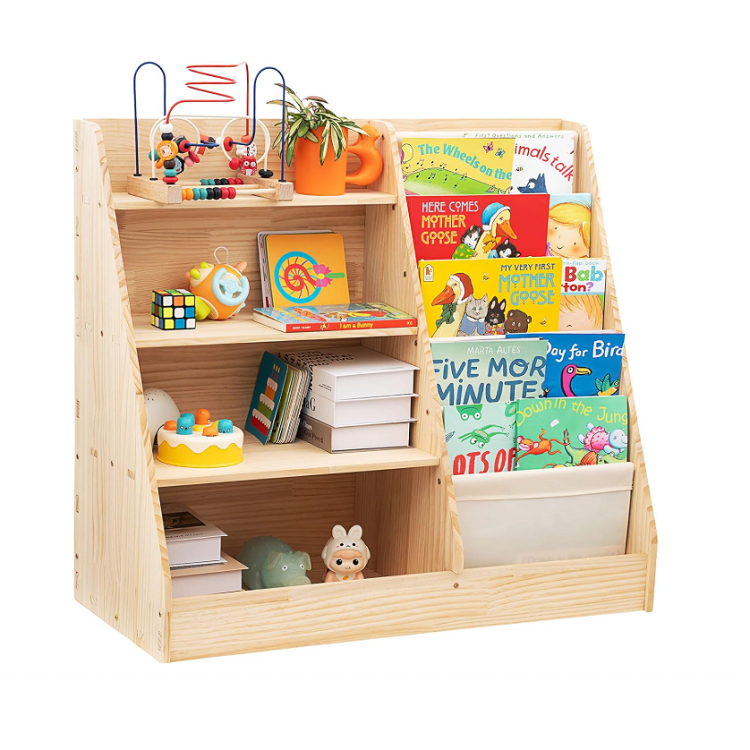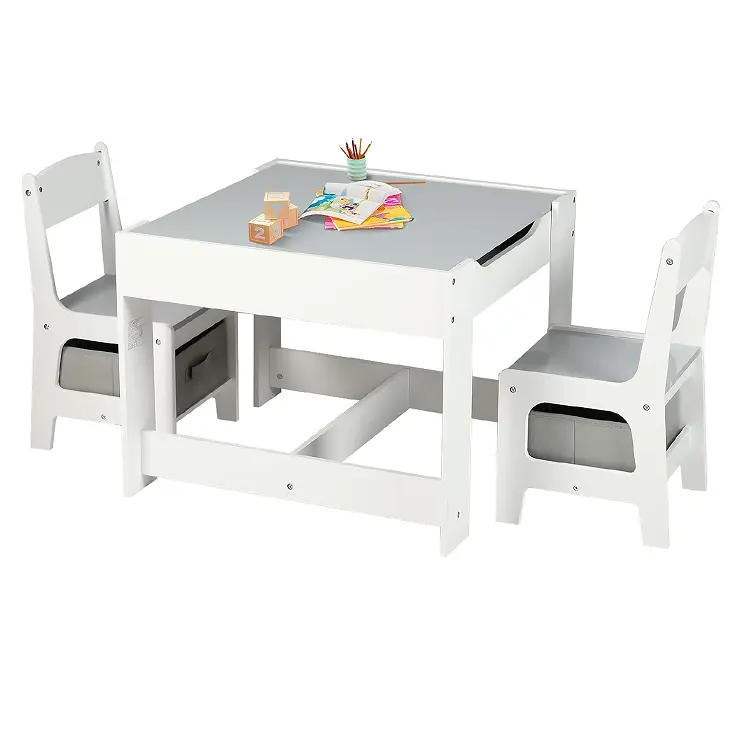What if the very furniture in a classroom or a child's play area could actively contribute to their development and learning? This article delves into the fascinating psychology of Montessori furniture and explores its profound impact on young minds. We'll uncover how the thoughtful design of Montessori furniture goes beyond mere aesthetics, creating a learning environment that nurtures independence, fosters a love for learning, and cultivates a sense of autonomy. If you're curious about the powerful connection between furniture impact and a child's development, keep reading.
1. What Exactly is Montessori Furniture and Why is its Design Important for Preschool?
Montessori furniture is more than just scaled-down versions of adult furniture. It is a carefully conceived system of pieces designed with the core tenets of the principles of Montessori education in mind. Unlike traditional school furniture, which often dictates how children interact with their environment, Montessori furniture empowers children to engage actively and independently. Its design is paramount because it directly influences a child's learning experience and their interaction with the learning space.
The design of Montessori furniture emphasizes functionality, accessibility, and aesthetics. Typically crafted from natural materials like wood, it prioritizes simplicity and a sense of order. Think of low shelves that allow children to easily access materials, lightweight tables and chairs that they can move independently, and designated spaces for different activities. This thoughtful furniture design isn't just about looking nice; it's about creating a harmonious and calm environment that supports a child's natural development. For instance, our Montessori Balance Beam embodies the Montessori principle of encouraging movement and coordination.
2. How Does the Design of Montessori Furniture Create a Conducive Learning Environment?
The psychology behind Montessori furniture centers on creating a learning environment that is both stimulating and conducive to focused learning. The furniture is designed to be aesthetically pleasing yet uncluttered, fostering a sense of relaxation and concentration. The use of natural materials like wooden furniture brings a touch of the outdoors in, creating a warm and inviting atmosphere.
One of the key principles of Montessori education is providing children with freedom of movement. Montessori furniture supports this by being lightweight and easy to move, allowing children to independently arrange their workspace according to their needs. This freedom of choice fosters a sense of autonomy and allows them to take ownership of their learning. Furthermore, the clear and organized layout that appropriate furniture facilitates helps children navigate their environment with confidence, reducing distractions and promoting deeper engagement. Imagine a child confidently selecting a book from a low shelf, carrying a light chair to a sunny spot, and settling down to read – this is the essence of a conducive Montessori environment.
3. What are the Psychological Effects of Natural Materials in Montessori Preschool Furniture?

The choice of materials in Montessori furniture is deeply rooted in understanding their psychological effects on children. Natural materials, particularly wood, are favored for their warmth, texture, and connection to the natural world. Unlike cold, sterile plastics or metals, wood evokes a sense of calm and tranquility, contributing to the emotional well-being of the child. Research has shown that exposure to natural materials can reduce stress levels and promote a more focused learning environment.
Beyond the tactile and visual benefits, wooden furniture is also perceived as durable and reliable, subconsciously instilling a sense of security in children. The simple, unadorned aesthetic of Montessori furniture design avoids overstimulation, allowing children to focus on the task at hand rather than being distracted by overly bright colors or busy patterns. This emphasis on simplicity and natural materials helps create a harmonious and grounding atmosphere, supporting the child's physiological and psychological needs.
4. In What Ways Does Montessori Furniture Nurture a Child's Sense of Autonomy and Self-Confidence?
A cornerstone of the Montessori philosophy is fostering independence and self-reliance. Montessori furniture plays a crucial role in achieving this by empowering children to interact with their environment on their own terms. The child-sized nature of the furniture, from low shelves to small tables and chairs, allows children to take charge of their learning space. They can independently select materials, arrange their workspace, and clean up afterwards.
This ability to act independently cultivates a powerful sense of autonomy and empowers children. When children can manage their environment without constant adult assistance, it builds their self-confidence and encourages them to take initiative. The freedom of choice afforded by accessible and movable furniture also fosters a sense of autonomy. They can choose where they want to work, what materials they want to use, and how they want to engage with them. This freedom promotes a sense of ownership over their learning journey, making them more active and engaged participants. Our Solid Wood Table and 2 Chairs Set exemplifies how furniture can empower children to take ownership of their learning space.
5. How Does the Design of Montessori Furniture Impact Learning and Cognitive Development?
The impact on learning from Montessori furniture is significant and multifaceted. The thoughtful design of furniture supports cognitive development by creating an environment that encourages exploration, experimentation, and focused attention. The clear organization and accessibility of materials on low shelves help children understand the order and structure of the world around them, fostering cognitive organization.
The ability to move furniture independently allows children to create workspaces that suit their specific needs, promoting active learning and problem-solving skills. For example, a child might choose to work on a large rug on the floor or at a small table with a friend, adapting their environment to the task at hand. This active engagement with their surroundings positively impacts their cognitive development by fostering spatial reasoning, problem-solving, and a deeper understanding of concepts. Furthermore, the design of furniture that promotes independence and self-direction helps children develop executive function skills, such as planning, organizing, and self-monitoring.
6. Why is it Important for Preschool Furniture and Educational Solutions to be Child-Sized and Accessible?
The principle of child-centric design is fundamental to Montessori education, and this is directly reflected in the scale and accessibility of preschool furniture. Furniture that is appropriately sized for children allows children to independently interact with their environment without needing adult assistance. Imagine a child trying to reach materials on a high shelf or struggling to climb onto an adult-sized chair – these experiences can be frustrating and disempowering.
Preschool furniture and educational solutions designed for children’s proportions ensure that everything is within reach, fostering independence and self-reliance. Low shelves make materials accessible, small tables and chairs promote comfortable and focused work, and appropriately sized sinks and toileting facilities encourage self-care. This accessibility is crucial for their overall development, both physically and emotionally. When children can navigate their environment with ease and autonomy, it builds their confidence and encourages them to explore and learn without unnecessary obstacles.
7. Can Montessori Furniture in a Montessori Kindergarten Help Reduce Anxiety and Stress Levels?

The environment plays a significant role in a child's emotional state. Montessori furniture, with its emphasis on order, simplicity, and natural materials, can contribute to a more calm and predictable learning environment, which can help reduce anxiety and stress levels in a Montessori kindergarten. The clear organization of materials and the defined spaces for different activities provide a sense of security and predictability, helping children feel safe and grounded.
The use of natural materials also has a calming effect, creating a less sterile and more welcoming atmosphere. Furthermore, the ability for children to move freely and choose their activities reduces feelings of constraint and frustration, which can be significant stressors for young children. By creating a harmonious and child-centered space, Montessori furniture helps to foster a sense of emotional well-being and security, allowing children to learn and grow in a supportive and stress-free environment.
8. Beyond the Classroom: How Can Montessori Furniture Principles Be Applied at Home?
The benefits of Montessori furniture extend beyond the classroom. Applying Montessori principles to designed bedroom furniture and play areas at home can have a similarly positive impact on a child's development. Creating a child-friendly environment at home involves providing accessible storage for toys and clothes, setting up a child-sized workspace, and offering opportunities for independence.
Think of low shelves where toddler can easily reach their books and toys, a small table and chairs for art projects or snacks, and a clothes rack with reachable hangers. These simple adaptations allow children to independently manage their belongings and engage in activities without constant adult intervention. By mirroring the principles of the Montessori kindergarten at home, parents can create a learning space that fosters self-confidence, independence, and a love for learning within the home environment. Even our Children's Bookcase & Toy Organizer could be a fantastic addition to a Montessori-inspired home.
9. What are the Key Considerations When Choosing Montessori Furniture for Your Montessori Perschool?
When selecting Montessori furniture for a Montessori perschool, several key considerations are paramount. Quality and durability are essential, as the furniture will be used daily by many children. Opting for wooden furniture made from sustainable natural materials ensures longevity and aligns with the Montessori emphasis on connecting with nature.
Safety is also a top priority. Make sure you choose furniture with rounded edges, non-toxic finishes, and stable construction to ensure the safety of the children. The size and scale of the furniture are crucial; it should be appropriately sized for the age group you are serving, allowing children to independently interact with it. Finally, consider the versatility and adaptability of the furniture. Can it be easily rearranged to create different learning zones? Does it offer storage options to keep materials organized? Thoughtful consideration of these factors will ensure that the furniture helps create a sense of order, beauty, and functionality in your preschool.
10. Where Can You Find High-Quality Montessori Furniture That Aligns with These Psychological Principles?
If you are looking for Montessori furniture that embodies the psychological principles discussed, it's crucial to choose a manufacturer committed to quality, safety, and authentic Montessori design. As Allen from China, representing a factory with 7 production lines specializing in children's solid wood furniture, we understand the importance of creating furniture that supports a child's development. We export our kids furniture to various regions, including the USA, and prioritize high-quality materials and craftsmanship.
Our Montessori furniture is carefully crafted with natural materials and non-toxic finishes, adhering to stringent safety standards. We understand that the design of furniture profoundly impacts a child’s learning, and we strive to create pieces that foster independence, self-confidence, and a love for learning. Explore our range of Montessori furniture to find pieces that will create a safe and inspiring learning environment for young children.
Key Takeaways About Montessori Furniture Psychology:
- Montessori furniture is designed with the child's developmental needs in mind, fostering independence and autonomy.
- The use of natural materials like wood creates a calm and harmonious learning environment.
- Child-sized and accessible furniture empowers children to take charge of their learning and care for their environment.
- The thoughtful organization and design of Montessori furniture helps reduce anxiety and promote focused learning.
- Applying Montessori furniture principles at home can extend these benefits beyond the classroom.
- Choosing high-quality, safe, and appropriately sized furniture is crucial for creating an effective Montessori environment.
Post time: Dec-23-2024





